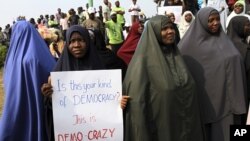The nationwide strikes that brought Nigeria to a standstill last week are over. Although fuel prices have been reduced, many feel the solution is merely cosmetic.
After President Goodluck Jonathan announced Sunday night that the price of fuel would be reduced by 35 percent to around 60 cents per liter, Union leaders halted strikes. The president called on the population to “get back to work" but it took soldiers patrolling the streets on Monday to finally quash the protests.
The price at the pump is still much higher than it was before the government cut its fuel consumer subsidy - previously set at just 45 cents per liter - on New Year’s Day.
Established in 1973, the subsidy is one of the only ways in which ordinary Nigerians can benefit from their country’s substantial oil wealth.
Now, reaction is mixed. Some Nigierians say the battle has been lost by agreeing to the new pump price. Others maintain that the new price should be accepted for the sake of peace and stability.
Other Nigerians are saying the move to reduce the price is merely cosmetic. Onyinye Gandhi, a civil servant who helped organize the protests, says the current price is still unacceptable in a country where most people live on less than $2 a day.
“It is unsatisfactory. It is basically no different to what it was before now; the reason people went onto the street," Gandhi said. "We should continue to take to the street. Because I can assure you that what the government is doing is just cosmetic. All the promises they are making are mere balloons. In a short while we will find they are mad dreams and the people will return to the streets.”
But attorney Ignatius Onwuemele, from Warri in Delta State, maintains Nigerians should accept the new price - if only to gain peace. He also calls on the federal government to compensate the families of those who lost their lives during the struggle.
“In the circumstances, what are you going to do. It is commendable because we don’t want lives to be lost anymore. Lots of lives have been lost here in Nigeria," noted Onwuemele. "And those people who have been lost, they should be compensated, because they have fought for freedom.”
The tensions over fuel also appear to have unleashed a more profound anger over corruption and inequality in the West African nation. The presence of the military is said to have led protesters to compare Goodluck Jonathan to military rulers of the past - and to call for revolution.
Onyinye Gandhi says the government needs to take a good hard look at itself to solve the problems that run through to the heart of Nigeria’s system.
“If the government does not have the political will to strike at those who use corruption and manipulation to stop the country from working - and striking at those who are corrupt in the system consistently and making the people of this country suffer, and then as an easy way out it chooses to come at the people, then you know the government is not ready. We cannot accept this!” said Gandhi.
Tens of thousands of people took to the streets last week during the strike, which saw global oil prices rocket as workers threatened to shut down crude oil production plants.
President Jonathan condemned what he described as “anarchy” on the streets.
“There has been a breakdown in law and order in some parts of the country as a result of the activities of some persons, who took advantage of the situation to follow their own interests and engaged in acts of intimidation, harassment and outright subversion," he said. "I express my sympathy to those who were personally affected by the protests.”
Northern Nigeria is also facing a surge in religious violence.
President Jonathan has declared a state of emergency in some places as the radical Islamist sect Boko Haram is blamed for a string of deadly shootings and bombings.
Strikes Over, Nigerians Still Unhappy with Fuel Prices
- By Jane Labous




